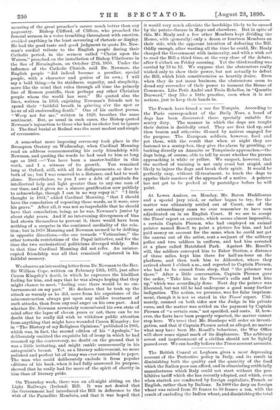A somewhat more imposing ceremony took place in the Brompton
Oratory on Wednesday, when Cardinal Manning read an address commemorating his early friendship with Newman, and quoting the words he had used to him as long ago as 1861 :—"You have been a master-builder in this work, and I a witness of its growth. You remained long at Oxford, still, with all its disfigurements, so dear to both of us ; but I was removed to a distance, and had to work alone. Nevertheless, to you I owe a debt of gratitude for intellectual help and light greater than to any one man of our time, and it gives me a sincere gratification now publicly to acknowledge, though I can in no way repay it." "I little thought in 1861," added Cardinal Manning, "that I should have the consolation of repeating these words, as it were, over his grave." After all, it was not so improbable that he should have that consolation, being, as he was, Newman's junior by about eight years. And if no intervening divergences of bias had shown themselves to prevent it, there would have been nothing of a surprise in the continued cordiality of the rela- tion; but in 1870 Manning and Newman seemed to be drifting in opposite directions,—the one towards " Vaticanism," the other towards restrictions of the Papal initiative, and for the time the two ecclesiastical politicians diverged widely. But to that time Cardinal Manning did not refer. An uninter- rupted friendship was all that remained registered in his faithful memory.


































 Previous page
Previous page